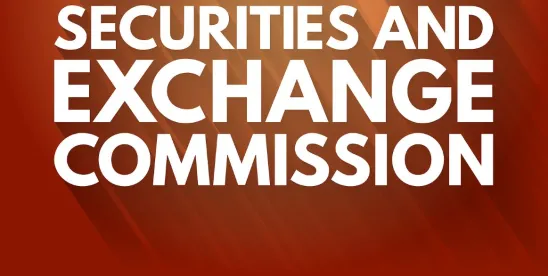The Voting Record and Public Statements of the Commissioners Provide a Roadmap
There has been much speculation on what SEC enforcement will look like under a new administration, especially now that President-elect Donald Trump has nominated former Commissioner Paul Atkins as the next SEC chair. To be sure, there will be a resetting of enforcement priorities under a new chair that comes with any change in administration. Clearly, some portion of the more aggressive enforcement cases and policies under current Chair Gensler will no longer be supported by the new, Republican‑controlled SEC — majority approval among the five Commissioners is required for any enforcement action. Indeed, the extensive voting record, speeches, public statements and dissents of the two current Republican Commissioners and former Commissioner Atkins provide some clues on the expected changes.
The two current Republican Commissioners (Peirce and Uyeda) have been unusually outspoken in objecting to certain enforcement actions, often voting in the minority against authorizing the action, or approving the matter with exceptions. Since Commissioner Uyeda was confirmed in June 2022, there were nearly 200 administrative proceedings (APs) approved where the vote authorizing the action was split 3-2 across party lines (approximately 20% of all APs according to our estimates). During that period, Commissioners Peirce and Uyeda issued 25 dissenting opinions or other statements (most of which were joined by both). The level of divisiveness on enforcement under Chair Gensler is unprecedented when compared to prior administrations.
A review of the voting record and dissents reveal eight categories of controversial cases and policies that may be jettisoned by a Republican‑controlled SEC:
1. Off-Channel Communications – Since December 2021, the SEC has obtained over $2 billion in penalties from more than 100 firms for recordkeeping violations involving off-channel communications. The earlier waves of settlements were unanimously approved, but in mid-2024, Commissioners Peirce and Uyeda started objecting to the penalties and undertakings in most off-channel cases.
- With the most recent wave of cases announced in September 2024, they voted against authorization of one action, issuing a dissent and urging their colleagues to “reconsider our current approach to the off-channel communications issue.” They argued that off-channel recordkeeping was an industry-wide problem that will not be solved through enforcement. In this case, the broker-dealer had longstanding and robust policies and procedures, but some employees did not comply. Striking a familiar theme, the two Commissioners objected to the settlement order’s suggestion that reasonable policies must achieve perfection, leaving firms with no achievable path to compliance. They suggested SEC staff engagement would be a more productive path forward. While the Staff will continue to expect compliance with the recordkeeping requirements (with enforcement possible in egregious cases), a continued wave of new off-channel enforcement actions with large civil penalties seems highly unlikely.
2. Crypto – Commissioner Peirce has been an outspoken critic of the SEC’s approach to crypto. Her views are well known through numerous speeches, interviews and other public appearances and commentary. In multiple dissents (joined by Commissioner Uyeda), she has pushed the SEC to work with industry “to craft sensible, timely, and achievable regulatory paths.”[1] She has repeatedly questioned whether the approach to crypto is the best way to protect investors, underscoring the “adverse consequences of the SEC’s approach to regulation in the crypto space.”[2] Crypto will receive immediate attention and industry engagement under a new SEC. Although the new Commission may still pursue enforcement in fraud cases, do not expect it to file crypto registration matters.
3. Cybersecurity – Cases involving cybersecurity breaches and the related disclosures have been another area of strong disagreement. In the litigated action against SolarWinds regarding a sophisticated hacking campaign (likely orchestrated by a nation-state threat actor), the district court dismissed most of the SEC’s claims.[3] In October 2024, the settlements with four customers of SolarWinds regarding their cybersecurity risk and breach disclosures likewise drew sharp criticism from Commissioners Peirce and Uyeda.
- In two of the cases, the SEC alleged that the issuers’ cybersecurity risk disclosures should have been updated to reflect more information about an actual breach and not discuss the risks in hypothetical terms. In the other two matters where there was specific disclosure of the breach, the SEC alleged that the failure to attribute the cyberattack to a nation-state threat actor was a material omission. The dissent accused the majority of “playing Monday morning quarterback” and engaging in “hindsight” to challenge the disclosures based on “immaterial, undisclosed details” about the attack. A new approach going forward may see the SEC adopt the dissent’s appeal to “treat[] companies subject to cyberattacks as victims of a crime, rather than perpetrators of one.”
4. Pay-to-Play – There have been six pay-to-play settlements under Chair Gensler, each of which was approved by a 3-2 vote with Commissioner Peirce issuing dissents.[4] In connection with the group of four settlements announced in 2022, Commissioner Peirce criticized the pay-to-play rule as a “poorly conceived means to pursue laudable ends” and urged the SEC to revisit the rule “to ensure that it does not hinder political engagement that is unconnected to an adviser’s quest for government clients.” She repeated the call for rule improvements in two separate dissents in 2024. While emphasizing the importance for advisers to adopt effective policies to prevent contributions made to win business and acknowledging the SEC’s need to examine for compliance, Commissioner Piece reiterated that the SEC “should exercise prudence in its enforcement efforts.” Given the criticisms of the pay-to-pay rule and compliance burdens, this could be a rule ripe for revisions.
5. Expanded Use of the Internal Accounting Control Provisions – Dissents by Commissioners Peirce and Uyeda have criticized the SEC’s increasing use of the internal accounting control provisions under Section 13(b)(2)(B) of the Exchange Act as a multi-use tool to “compel[] companies to adopt and adhere to policies and procedures that the Commission deems good corporate practice.”[5]
- In one matter, the issuer was charged with violating the accounting control provisions by failing to have reasonably designed controls to answer a legal question— whether a Rule 10b5-1 share repurchase plan complied with the requisite regulatory conditions. In another, the matter involved a cybersecurity breach, and the SEC alleged that the company’s computer systems were an asset subject to the internal accounting controls provision (thus providing the SEC with “a hook to regulate public companies’ cybersecurity practices.”) Both settlements are premised on an untested, overly broad interpretation of Section 13(b)(2)(B) and represent the type of stretch case the Staff likely could not get approved under a new administration.
6. Broad Interpretations of Materiality –Commissioners Peirce and Uyeda voted against the enforcement action against Keurig Dr Pepper Inc. (Keurig), with Commissioner Peirce issuing a dissent challenging the allegations of materiality. The action alleged that Keurig’s disclosures that its K-Cup pods were “effectively recyclable” were materially misleading by not disclosing feedback from two recycling companies that recycling pods may not be commercially feasible. The dissent first argued that the statements were not misleading — the disclosure that pods could be recycled was factually accurate and not a guarantee that all recycling facilities would accept the pods or that consumers would recycle them. The dissent also argued that the order failed to allege that the statements were material: “That some consumers thought, among other factors, about environmental factors does not mean that the recyclability of pods was material to investors.” Like the other examples discussed, cases advancing expansive views of materiality are likely to be met with skepticism under the new SEC.
7. Other Examples of Overreach – There were other examples where Commissioners Peirce and Uyeda issued dissents asserting that the SEC was pushing the envelope on the legal interpretation of the securities laws.
- In one matter alleging failures to maintain adequate disclosure controls and procedures surrounding workforce-related risk disclosures, Commissioner Peirce argued that the SEC’s order “[did] not articulate any securities law violations.”[6] She expressed concern that the SEC was overreaching and contorting the securities laws to find a connection between the company’s internal issues and its disclosure obligations.
- In another matter alleging that the issuer failed to fully disclose the reasons for a CEO termination, Commissioners Peirce and Uyeda challenged the SEC’s “novel” interpretation of the executive compensation disclosure requirements: “If the Commission intends to expand a settled disclosure requirement, the Commission or its staff should publicly articulate its views through rulemaking or formal guidance so that companies understand the requirement before the Commission starts enforcing it.”
- Commissioners Peirce and Uyeda raised similar objections to the SEC’s expansive interpretation of Section 17(a)(2) of the Securities Act in a case against a third-party pricing service that provided independent pricing for thinly-traded and hard-to-price fixed income securities. The dissent argued that the “in the offer or sale” requirement of Section 17(a)(2) was not satisfied because the vendor’s disclosures were “far removed from any offers or sales of securities” and emphasized that the vendor was selling a pricing service, not the securities themselves. The dissent would instead prefer a rulemaking approach, asserting that a “one-off enforcement action” resting on a strained statutory interpretation was “not the right way to make regulatory policy.”
- All three of these cases strike a familiar “regulation by enforcement” criticism. As with the other cases discussed above, the Staff will be constrained under the new SEC in pushing any case that appears to stretch the interpretation of the securities laws.
8. Rising Civil Penalties – There was a big push under Chair Gensler and former Enforcement Director Grewal for higher civil penalties to achieve the intended deterrent effect. However, at times the penalties imposed in recent settlements seemed disproportionate to the investor harm or pecuniary gain, or otherwise were not grounded in the penalty statute. In over 200 instances, Commissioners Peirce and Uyeda voted to approve the enforcement recommendation except as to the civil penalties imposed. Under the new SEC, expect a dialing back of civil penalties — especially with respect to issuer penalties that ultimately are borne by shareholders — and a return to corporate benefit analysis underling the SEC’s 2006 statement on financial penalties.
The recent speeches and dissents of Commissioners Peirce and Uyeda harken back to many of the views previously expressed by Commissioner Atkins, which is not at all surprising as Peirce and Uyeda served as counsel to Commissioner Atkins during his time at the SEC. Eight quotes from a few key Atkins speeches while he was a Commissioner further portent some of the familiar enforcement themes that may reemerge under the new SEC:
1. Avoidance of Overreach – The SEC should not be “devising new legal theories to reach behavior that does not clearly violate an existing rule. . . . We should not be playing ‘gotcha’ with our enforcement powers.”
2. Enforce the Laws as Written – “By respecting legal boundaries and not ‘pushing the envelope,’ the SEC provides predictability to investors, individuals and companies as to unacceptable conduct.”
3. Guidance Where Appropriate – “if clarification is needed, we should change the rules or issue formal interpretations with future effect.” Any formal rulemaking must “give affected parties an opportunity to comment” and “requires us to address those comments.”
4. Willingness to Bring Enforcement Actions – “If fraud and deception have taken place, we should and will pursue it.”
5. Hold Individual Wrongdoers Accountable – “individuals commit fraud; corporations don’t.”
6. Predictability in Civil Penalties – There should be more predictability, and the Staff should adhere to the SEC’s penalty guidance: “Even after the penalty statement, too often our penalties seem to be justified on little more than that they ‘feel right.’”
7. Better Transparency into Enforcement Process –The Staff should adopt a written and uniform “open jacket” policy for Enforcement matters and show defense counsel the evidence it has against the defendant: “That is called due process.”
8. Potential Reforms to Wells Process – “it makes sense that the Commission should consider whether it is time to convene a Wells-like committee to ‘bring to date’ the best thinking on enforcement practices.”[7]
Takeaways
The extensive record discussed above suggests significant changes in the enforcement program under a new SEC, including a potential return to more traditional enforcement cases with greater emphasis on egregious conduct with significant investor losses or pecuniary gain and a move away from “pushing the envelope” type cases. Regulation by enforcement could be replaced with greater interaction with the Staff, informal guidance or lighter-touch rulemaking. Given former Commissioner Atkins’s calls for enhanced transparency and efficiency in the enforcement process, investigations may proceed more efficiently, be resolved quicker and, where appropriate, result in settlements for material, substantive violations with civil penalties that adhere to the SEC’s penalty guidance and are calibrated to elements of the penalty statute.
A new direction in enforcement, however, does not necessarily mean that the Staff would no longer focus on the issues underlying the more controversial cases under Chair Gensler. For example, while the SEC may not bring waves of high penalty, off-channel communications cases against registered entities, the Staff will expect those records to be retained, and may more regularly request their production in exams and investigations. Issues that may have been referred to Enforcement in the past may stay with Exams, or the investigative Staff could look harder to find a substantive violation over mere compliance policy or internal control violations. SEC enforcement investigations are fact investigations typically focusing on potential substantive violations and investor harm. It is rare for Enforcement Staff to set out to bring a compliance policy case. Under the new SEC, it is more likely that investigations that do not reveal substantive violations will be terminated without an enforcement recommendation instead of seeking to resolve the matter with a compliance violation. Relatedly, while enforcement actions based solely on a compliance issue seem less likely, investigations and exams will still focus on a firm’s culture of compliance as the lack of robust internal controls and reasonable policies are typically viewed as a “red flag” that may cause Staff to dig deeper.
Brandon McCoy also contributed to this article.
[1] Statement on Settlement (Feb. 14, 2022); see also Commissioner Peirce dissents: Statement (July 14, 2021); Statement (Aug 9. 2021). The Commissioner voting records tells only part of the story since votes on litigation matters are not made public.
[2] On Today’s Episode of As the Crypto World Turns: Statement (March 5, 2024; see also Omakase: Statement (Sept. 16, 2024).
[3] See SEC v. SolarWinds Corp., 2024 WL 3461952 (S.D.N.Y. July 18, 2024).
[4] See Laudable Ends, Poorly Pursued: Statement Regarding Recent Pay-to-Play Rule Settlements (Sept. 15, 2022); There’s Got to Be a Better Way: Statement of Dissent (April 15, 2024); Expect the Inquisition: Dissent (Aug. 19, 2024).
[5] Commissioner Peirce raised similar concerns in connection with a 2020 settlement. See Statement of Commissioners Hester M. Peirce and Elad L. Roisman (Nov. 13, 2020).
[6] The SEC Levels Up: Statement (Feb. 3, 2023). Commissioner Uyeda did not join in the dissent and voted to approve the action except as to the $35 million penalty and the whistleblower protection rule charge under Exchange Act Rule 21F-17(a). Regarding the Rule 21F-17 claim, Commissioner Peirce contended that the order did not explain how the company’s separation agreements impeded former employees from communicating with the SEC. She highlighted that the SEC was unaware of any instances where the issuer enforced the notice requirement against former employees.
[7] Paul Atkins and Brad Bondi, Evaluating the Mission: A Critical Review of the History and Evolution of the SEC Enforcement Program, 13 Fordham J. Corp. & Fin. L.367 (2008) (providing detailed recommendations in calling for a new advisory committee to update the 1972 recommendations of the Wells Committee).





 />i
/>i

